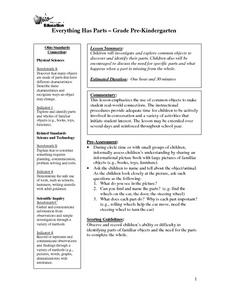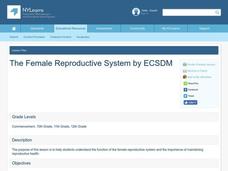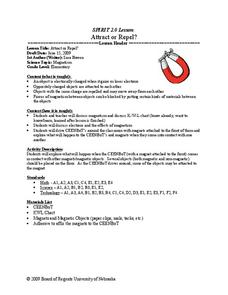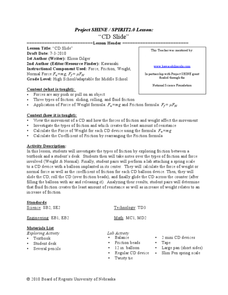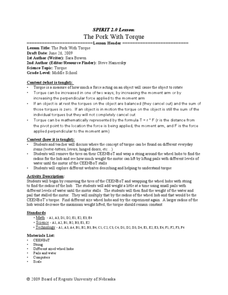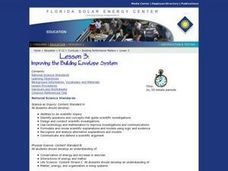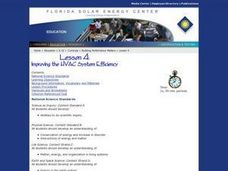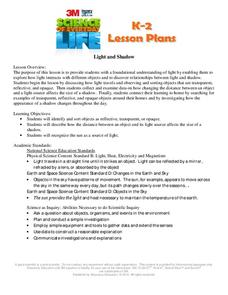Curated OER
Plane Mirrors
Students investigate the law of reflection by using mirrors. In this physics lesson plan, students operate a robot using IR controllers. They explain the path of light as it reflects through a surface.
Curated OER
Puberty
Eighth graders describe the changes their body undergoes during puberty. In this health science lesson plan, 8th graders explain how the hypothalamus and pituitary gland play a major role in the process. They identify the different parts...
Curated OER
What is Health?
Eighth graders identify the three aspects of health and wellness. For this health science lesson, 8th graders analyze how certain events in their life affect their health. They share their insights to class.
Curated OER
Everything Has Parts
Students investigate and explore common objects to discover and identify their parts. They also are encouraged to discuss the need for specific parts and what happens when a part is missing from the whole.
Curated OER
The Female Reproductive System
Students identify the different parts of the female reproductive system. In this health science lesson, students explain the functions of each part. They research Female Reproductive Health Issue and share their findings in class.
Curated OER
Carbohydrates, Proteins, and Fats
Young scholars describe the properties of carbohydrates, proteins and fats. In this health science lesson, students identify food sources where these nutrients can be found. They explain how they affect our body.
Curated OER
The Male Reproductive System
Young scholars name the different parts of the male reproductive system. In this health science lesson, students research health issues affecting the male reproductive system. They create a presentation and share it to class.
Curated OER
Attract or Repel?
Students explain why some objects attract and some do not. For this physics lesson, students investigate the magnetic properties of objects using CEENBoT. They give some important applications of magnets.
Curated OER
CD Slide
Pupils identify the different types of friction. For this physics lesson, students explain how weight affects friction. They calculate normal force and coefficient of friction using a mathematical formula.
Curated OER
The Pork With Torque
Learners determine the torque of CEENBoTs wheel hub. In this physics lesson, students reinforce their learning by exploring interactive websites on torque. They give real life applications of torque.
Curated OER
Beanbag Toss
Learners explore physical education by participating in a class game. In this bean bag toss lesson, students utilize masking tape to create targets which they launch bean bags into from far away. Learners collaborate in groups to compete...
Curated OER
A Delicate Balance
Students investigate energy balance equation for five fictitious middle school students by using an energy balance clinic scenario.
Curated OER
Improving the Building Envelope System
Students explain the different heat transfer mechanisms and how they influence the building envelope. They develop ways in which the building envelope can be improved and test hypotheses about building envelope designs.
Curated OER
Improving the HVAC System
Students describe the components of an HVAC system and determine which factors influence how efficient the system can be. They work together to develop hypotheses about the systems and their cost effectiveness and efficiency.
Curated OER
Kure Waste Chase Game Lesson
Students work together to identify marine debris. They explain the effect of the debris on various ecosystems. They draw different types of ocean currents as well.
Curated OER
The Wonderful World of Waves (Wave Basics)
High schoolers define amplitude, wavelength, frequency, and period, calculate period given frequency, and calculate frequency given period, define crest and trough and locate both on diagram of wave, differentiate between latitudinal and...
Curated OER
The Envelope System: A Partial Solution
Studnet identify examples of conduction, convection and radiation. They develop an example of a building envelope. They also describe how heat transfer mechanisms can affect home energy costs.
Curated OER
Heat Discrepancies
Students answer the question, "Why do Eskimos build houses out of ice to keep warm. Since heat goes from hot to cold, don¿¿¿t the ice walls take away the warmth inside the house?" They explain how snow or ice can actually be insulators.
Curated OER
Catapults
Students test catapults. In this physics lesson, student conduct scientific investigations that require them to test catapults. Students practice their problem solving skills as they employ the use of the scientific method.
Curated OER
Light and shadow
Students experiment with light and shadow. In this light lesson, students look at the relationship between shadows and light. They experiment with light source, shadow size, transparent objects and reflective objects.
Curated OER
Earth's Energy Cycle: Albedo
Students complete all of the steps in the scientific inquiry process to study Earth's energy cycle; most specifically temperature and the effects of albedo (energy reflected back from Earth's surface) on temperature.
Curated OER
Living Sources of Weathering
In this sources of weathering worksheet, learners read about the various things that cause weathering including plants and animals. They answer four critical thinking questions about weathering.
Curated OER
Diversity/Natural Selection
High schoolers examine mechanisms behind biological evolution and the theories that feed it, and are able to demonstrate their knowledge of these theories in a story.
Curated OER
Introduction, Advance Organizer, and the Problem
Students describe the three-phrase process for designing and developing energy-efficient buildings. They develop solutions and identify ways to make homes more comfortable and productive in regards to energy.





